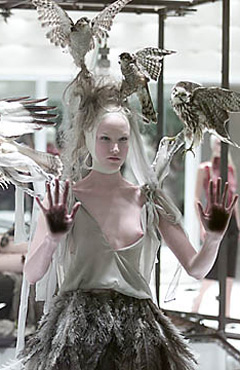Serendip is an independent site partnering with faculty at multiple colleges and universities around the world. Happy exploring!

Randomness versus an Algorithm with a Random Step (... one in the same?)
I have spent the last two weeks trying to convince myself that an algorithm with a random step produces a different outcome than pure randomness does. However, after much thought I am only partly satisfied with the explanation I have generated, and thus am seeking further clarification. In the most basic sense, to me randomness implies that any outcome can occur. Think of a board (like a checkerboard) where a space may either be colored red or black. If the coloring was random any pattern could emerge, it could be all black or red, it could be checkerboard, or it could have no distinguished pattern at all.
post for 02/25
Technology has shaped human life in various ways; people can travel faster, live longer, learn more effectively, etc. What I think is the most important difference that technology makes is increasing the availability of various resources, which gives humans a number of choices when making a decision; couple of examples related to gender and information that are discussed in the class evidently show such phenomena.
Maybe I can't be held be held responsible for my actions in a court of law (or at least Dennett says as much)
According to Dennett, our actions are all results of outside forces, and, as we discussed in class today, that takes agency away from us. I don't buy into this. Yes, I think outside forces determine our emotional responses, but I don't think they determine our behavioral responses. There is a degree of randomness in our behavioral actions in that they are not direct results of contingencies set up by our environments. For example, say that one kid pushes another down on the playground.

Memes and sleep
Dennett caught my attention when he discussed what we as humans saw as the point of life. A life of exploring, learning new things is not exactly the way Mother Nature sees it. Instead he mentions that, "a life of sleep is as good a life as any other and in many regards better --- certainly cheaper --- than most (p.340). Now that I believe is a great motto to live by considering the lack of attention many of my peers seem to pay to the subject of sleep. Wouldn't be interesting if our bodies worked similarly to bears and other mammals that hibernate all winter? Now that would be an interesting experiment, could we sleep through winter? what kinds of changes would our bodies go through?

Dennett and Thinking Evolutionarily
It is strange to me that I agree with the concept that evolution can be applied to multiple disciplines, yet I find Dennett's theory of memes far too simplified. He draws support for his idea from biologists, linguists, historians, and philosophers among others, creating an argument drawn from both the humanities and the sciences... but the idea of memes seems to reduce everything to a very boring formula. I feel that if what Dennett says is true, then we could reduce all human thought to mathematical equations. Life just isn't that simple.




